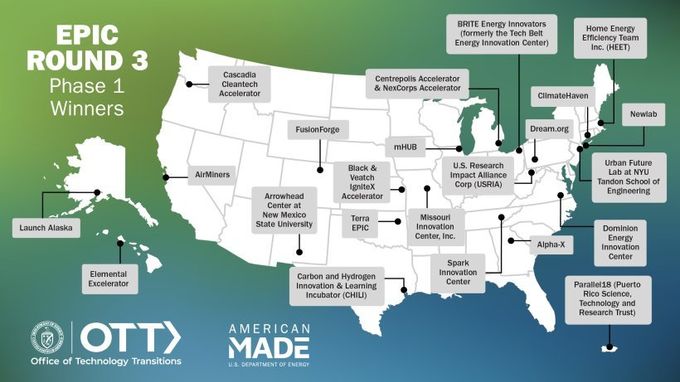12 Houston climatetech startups join Greentown Labs' growing incubator
Startup Talk
More than 40 climatetech startups joined the Greentown Labs Houston community in the second half of 2025, 12 of which hail from the Bayou City.
The companies are among a group of nearly 70 total that joined the climatetech incubator, which is co-located in Houston and Boston, in Q3 and Q4.
The new companies that have joined the Houston incubator specialize in a variety of clean energy applications, from green hydrogen-producing water-splitting cycles to drones that service wind turbines.
The local startups that joined Greentown Houston include:
- Houston-based Wise Energie, which delivers turnkey microgrids that blend vertical-axis wind, solar PV, and battery storage into a single, silent system.
- The Woodlands-based Resollant, which is developing compact, zero-emissions hydrogen and carbon reactors to provide low-cost, scalable clean hydrogen and high-purity carbon for the energy and manufacturing sectors.
- Houston-based ClarityCastle, which designs and manufactures modular, soundproof work pods that replace traditional drywall construction with reusable, low-waste alternatives made from recycled materials.
- Houston-based WattSto Energy, which manufactures vanadium redox flow batteries to deliver long-duration storage for both grid-scale projects and off-grid microgrids.
- Houston-based AMPeers, which delivers advanced, high-temperature superconductors in the U.S. at a fraction of traditional costs.
- Houston-based Biosimo, which is developing bio-based platform chemicals, pioneering sustainable chemistry for a healthier planet and economy.
- Houston-based Ententia, which offers purpose-built, generative AI for industry.
- Houston-based GeoKiln Energy Innovation, which is developing a new way to produce clean hydrogen by accelerating natural geologic reactions in iron-rich rock formations using precision electrical heating.
- Houston-based Timbergrove, which builds AI and IoT solutions that connect and optimize assets—boosting visibility, safety, and efficiency.
- Houston-based dataVediK, which combines energy-domain expertise with advanced machine learning and intelligent automation to empower organizations to achieve operational excellence and accelerate their sustainability goals.
- Houston-based Resonant Thermal Systems, which uses a resonant energy-transfer (RET) system to extract critical minerals from industrial and natural brines without using membranes or grid electricity.
- Houston-based Torres Orbital Mining (TOM),which develops autonomous excavation systems for extreme environments on Earth and the moon, enabling safe, data-driven resource recovery and laying the groundwork for sustainable off-world industry.
Other startups from around the world joined the Houston incubator in the same time period, including:
- Colorado-based ATS Energy
- Pittsburgh-based FlowCellutions
- Boerne, Texas- based LOCOAL
- Montreal-based Secant Fuel
- California-based HGenium
- San Francisco-based Candid Intelligence
- Stockholm-based Blykalla
- France-based Dracula Technologies
- Los Angeles-based Dugu Systems
- Israel-based LAVA
- Denmark-based Reblade
- Denver-based Sphinx
- Brooklyn-based Carbion
- Spain-based Catalyxx
- Germany-based FLUIDXLAB
- Portugal-based Infinite Foundry
- Montana-based MagDrive
- Dallas-based MCatalysis
- Italy-based Nano-Tech SpA
- Stockholm-based Nobula
- Los Angeles-based Nominal
- Washington-based Pure Blue Tech
- San Francisco-based SpiralWave
- The Netherlands-based Sustonable
- India-based AeroNero
- Italy-based Circular Materials
- Birmingham-based ecobrew
- Norway-based Ocean Visuals
- Germany-based Solar Materials
- Switzerland-based Swiss Vault
- XMTRACE
More than 100 startups joined Greentown this year, according to an end-of-year reflection shared by Greentown CEO Georgina Campbell Flatter.
Flatter joined Greentown in the top leadership role in February 2025. She succeeded former CEO and president Kevin Knobloch, who stepped down in July 2024.
"I moved back to the United States in March 2025 after six years overseas—2,000 miles, three children, and one very patient husband later. Over these months, I’ve had the chance to hear from the entrepreneurs, industry leaders, investors, and partners who make this community thrive. What I’ve experienced has left me brimming with urgent optimism for the future we’re building together," she said in the release.
According to Flatter, Greentown alumni raised more than $2 billion this year and created more than 3,000 jobs.
"Greentown startups and ecosystem leaders—from Boston, Houston, and beyond—are showing that we can move further and faster together. That we don’t have to choose between more energy or lower emissions, or between increasing sustainability and boosting profit. I call this the power of 'and,'" Flatter added. "We’re working for energy and climate, innovation and scale, legacy industry and startups, prosperity for people and planet. The 'and' is where possibility expands."
---
This article originally appeared on EnergyCaptialHTX.com.

 The DOE's OTT selections are nationwide. Photo via energy.gov
The DOE's OTT selections are nationwide. Photo via energy.gov



